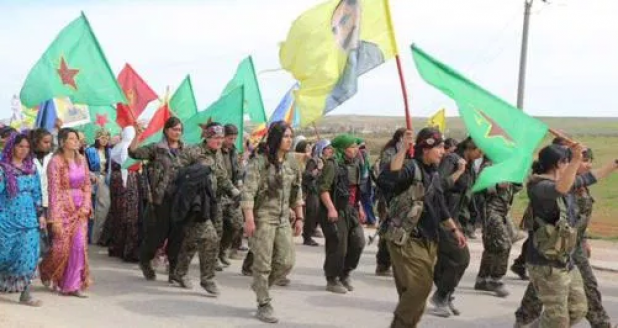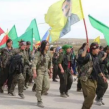
The Kurdish Predicament in Syria: Balancing Russia, Turkey and the United States
Publication: Terrorism Monitor Volume: 13 Issue: 21
By:

Russia, on September 30, launched airstrikes in support of the Syrian government in order to stop the advance of the Turkish and Saudi-backed Islamist Sunni rebel group Jaysh al-Fatah (“Army of Conquest”) into the country’s coastal Alawite Shi’a heartlands (NowLebanon, August 27). Meanwhile, the United States provided 50 tons of ammunition and weapons to the Syrian Kurds and its Arab allies to launch an operation to attack Raqqa, the Islamic State’s self-declared capital in eastern Syria (ANF, October 14). Turkey is also reportedly concerned that, in addition to the United States, Russia will also soon provide weapons to the Kurds (Daily Sabah, October 14). The aim of this article is to outline these key developments, to illuminate the serious challenges facing Syria’s Kurds and to suggest their most likely course of action.
Russia vs the United States
The launch of the Russian operations and statements from Kurdish officials about potential Russian support have raised questions over whether the Syrian Kurds are considering asking for Russian support in order to expand their territory in Aleppo or else maintain their alliance with the United States to destroy the Islamic State in northern Syria. There were already unconfirmed rumors that Kurdish security officials have been meeting with the Russians in Latakia, a Syrian government-held coastal city, in order to coordinate around the Kurdish-held town Hasakah to control the Syrian-Iraqi border, which an official from the Kurdish Democratic Union Party (Partiya Yekîtiya Demokrat—PYD) rejected as propaganda (Welati, October 8; Kurdwatch, October 13). Last week, the PYD announced that the PYD-led administration would open an office in Moscow in the future (ANHA, October 24).
The PYD has held several meetings with Russian officials—like Deputy Foreign Minister Mikhail Bogdanov—since 2012, and enjoys good diplomatic relations with Russia (Terrorism Monitor, May 18, 2012). The PYD supported the Russian-backed Geneva talks between the Syrian government and the opposition to find a political solution to the conflict, although the peace talks failed in February 2014, and the war continued.
However, since the Islamic State attacked the mainly Kurdish Syrian border town of Kobane in September 2014, the Syrian Kurds have become the main ally for the U.S.-led coalition against that jihadist organization. This is despite the fact that the United States knows there are close relations between the PYD and the Kurdistan Workers Party (Partiya Karkerên Kurdistanê—PKK), which the United States and the EU consider a terrorist organization. Nevertheless, on October 10, the PYD co-chairman, Salih Muslim, met with Russian Deputy PM Bogdanov again in Paris to discuss the fight against the Islamic State (Welati, October 10).
Despite the good Russian-Kurdish diplomatic contacts, it is more likely that the PYD will strengthen their relations with the United States in the future, since they can only advance against the Islamic State with that country’s support. Without U.S. airstrikes since September 27, 2014, the PYD’s armed militia, the People’s Protection Units (Yekîneyên Parastina Gel—YPG), would have never been able to connect PYD-controlled administrations of Kobane and the Hasakah area by capturing Tal Abyad in June 2015. Likewise without U.S. support, Syrian Kurdish territories would be very vulnerable to Islamic State attacks. If the YPG or PYD decided to work openly with Russia, this could end U.S. air support. So while Salih Muslim met Bogdanov in October, Ilham Ahmed was in the United States seeking more support (Al-Monitor, October 8).
Conflicting Policies
The Kurds could try to benefit from the conflicting policies of the United States, Russia and Turkey. While the United States wants to defeat the Islamic State, Russia principally wants to defend Syrian President Bashar al-Assad and Turkey only wants to prevent Kurdish expansion and support its favored Islamist-leaning rebel groups against al-Assad. Meanwhile, the main goal for the YPG is to create a contiguous Kurdish controlled region from Derik to Efrin, alongside the Syrian Turkish border, and unite their three administrations in Kobane, Efrin and Hasakah provinces.
Turkey’s Syria policy since the Kurds took Tal Abyad in June, is to prevent Kurdish expansion westwards from Kobane toward Efrin. Turkey, therefore, does not want Jarabulus to fall into YPG hands, even if that means the city stays under the control of the Islamic State, as at present. “It is in Turkey’s interest to keep Jarabulus under [Islamic State] control,” a YPG fighter told this author. [1] However, the jihadist organization’s presence gives the YPG an excuse to try to take it. As a result, Turkey wants to create a safe zone to protect non-Islamic State rebels in the area and thereby prevent the YPG from connecting the Kurdish-controlled areas of Kobane and Efrin without necessarily being seen to support the Islamic State.
However, this safe zone plan so far has failed, and the Islamic State has increased their advances in Aleppo’s countryside, pushing back Turkish-supported rebels even more. Given the failure of the Turkish strategy to block further Kurdish advances in this area, the Kurds now hope Russian jets will protect them from the potential threat from Turkish jets carrying out airstrikes against YPG advances in the northern Aleppo countryside (Al-Monitor, October 1).
The United States, on one hand, is not worried about Kurdish expansion. The main goal of this country is to destroy the Islamic State in Syria and in Iraq, in cooperation with local Kurdish and Arab forces. Furthermore, Washington does not appear to be interested in regime-change in Syria, and prefers to fight only the jihadist organization. As a result, there are several disputes between the United States and Turkey over the former’s support for YPG rebels. Turkey might not oppose the YPG and allied Arab groups taking Raqqa, but Jarabulus for Turkey is a red line, given its strategic importance. Although the United States says that they will arm rebels for them to take on Raqqa, the priority for the YPG, however, is Jarabulus.
On the other hand, the goal of Russia is to protect Syria’s Alawite heartland and to keep al-Assad in power. Therefore, it might be interested in working with the Syrian Kurds in order to cut off the rebel lifeline in Azaz and the Syrian Bab al-Salameh border gate in the Aleppo governorate, a key channel for Turkish aid to rebels. Thus, if the Kurds in Syria manage to advance from Kobane all the way to Efrin, they could cut off the strategic border gate from Turkish-supported rebel groups.
“If Russia fights [the Islamic State], this is good step, too. The coalition helped us to liberate Giri Spi [Tal Abyad], Kobane and Hasakah… The coalition will continue to support YPG: they have to liberate Raqqa, and will help us in Jarabulus,” senior Kurdish official Idris Nassan explained. [2]
However, the Kurds also recognize that Russia is not interested in fighting the Islamic State: “Their aim is not to fight [the Islamic State], but to steal the role [in fighting the group], and this is what Russia does. It tries to re-establish Assad’s dominance. For example, they do not have an aim to recognize Rojava’s canton [local PYD-led administrations],” according to senior PKK commander Duran Kalkan (Milliyet, October 6).
Moreover, PYD Co-Chair Salih Muslim has said al-Assad cannot stay in power, another significant difference between the group and Russia: “But as far as al-Assad remaining in power, we think differently. Al-Assad cannot remain in power as before… in the long term, it seems inconceivable that the majority of the Syrian people would accept his leadership anymore” (Al-Monitor, October 1).
Therefore, in reality, Russia cannot offer the Syrian Kurds much apart from protection against al-Qaeda’s Jabhat al-Nusra and the rebel’s Military Operation Room in Aleppo, or to supply the YPG with limited weapon supplies. Since last summer, there have been several clashes between the YPG and Nusra-allied rebel groups around Efrin and the Kurdish neighborhood of Shaykh Maqsoud (Aranews, July 31).
But, these rebel groups are growing weaker and weaker due to Russian airstrikes targeting them and Islamic State advances in Aleppo and towards Azaz. That jihadist organization is now already seven kilometers from Efrin and could capture Azaz (Welati, October 14). This will make it even more difficult for the Turks to protect its favored Syrian rebels or to create a safe zone alongside its border. Therefore, this arguably reduces the Kurds’ need for direct Russian support.
As a result, the YPG said in a statement that their relations with the U.S.-led anti-Islamic State coalition would continue. They are afraid this would prevent the United States from arming them in the future, or provide them with ongoing airstrikes: “[This relation] will not simply continue but emerge stronger against committed enemy, the Daesh [Islamic State] terrorists… Yet, some sides are trying to distort the collaboration between the YPG and the coalition,” the YPG said (YPG Rojava, October 2).
Moreover some Kurdish officials say cooperation with Russia is impossible, or could hurt their cooperation with local Sunni Arabs. “We are working with the Free Syrian Army,” local Syrian defense minister in Kobane, Ismet Sheikh Hassan, said, adding “They are against al-Assad, so cooperation [with the Russians] is impossible… It would be contradictory because they back the regime clearly.” [3]
Conclusion
At this point, it is unlikely the Kurds to support the Russians in their fight for the al-Assad government. Kurdish support for Russian-efforts to keep al-Assad in power could damage their relations with the FSA rebels they need for the Raqqa offensive, and also risk losing U.S. air support. The U.S. airstrikes were one of the main reasons the Kurds were able to defeat the Islamic State in Kobane. Without them, it would be difficult for the Kurds to hold their lines or to make further progress, particularly in the key area between Efrin and Kobane, since they already lack the manpower required to take the towns. Therefore, it is unlikely that the Kurds will risk Western support for Russia, even though the United States itself will need the Kurds and allied rebels to defeat the Islamic State.
Wladimir van Wilgenburg is a political analyst specializing in issues concerning Iraq, Iran, Syria and Turkey with a particular focus on Kurdish politics.
Notes
1. Author’s interview with YPG fighter Heval Serfiraz in the YPG headquarters, close to Ayn al-Issa, October 13, 2015.
2. Author’s interview with Idris Nassan, deputy foreign minister in Kobane, October 11, 2015.
3. Author’s interview with Ismet Sheikh Hassan, the local defense minister in Kobane, October 15, 2015.





